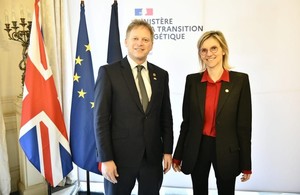New UK-France partnership to bring ‘more energy security and independence’
UK and French governments have signed a new deal to help both nations achieve greater energy security by moving away from fossil fuels and towards renewables and nuclear power.
A new partnership between the UK and French governments has been signed today (10 March), which will help both nations make the move towards greater energy security by moving away from fossil fuels and towards renewables and nuclear power.
Under a new deal signed today by Energy Security Secretary Grant Shapps and France’s Energy Minister, Agnes Pannier Runacher, the UK and France commit to further cooperation on civil nuclear, to capitalise on both countries ambitions to significantly grow their sectors.
Already, the UK and France have a decades-old partnership on nuclear power. French company EDF are leading the development of Hinkley Point C in Somerset, and following an historic £700 million investment announced by Grant Shapps last November, the UK government is a co-shareholder in the proposed Sizewell C project in Suffolk with EDF. This investment represented the first state-backing of a nuclear project in Britain in over 30 years.
The statement also commits France and the UK to work together, along with other G7 leaders, to take concerted action to cut reliance on civil nuclear and related goods from Russia, including working to diversify their supplies of uranium and nuclear fuel production capability.
The UK currently has 3 interconnectors with a capacity for 4 GW of electricity interconnection with its French partners. Today’s agreement could also have the potential to support an increase in electricity interconnection with France by up to 2 thirds, subject to regulatory approval. Increased interconnection will support the UK’s ambition to have at least 18 GW of interconnection capacity by 2030.
Mr Shapps hopes the agreement will help lower energy bills for consumers, and boost the availability of clean renewable energy between both countries. It will also see both work to tackle barriers to deploying fast-developing low-carbon technologies, including hydrogen and carbon capture and storage (CCUS), helping create tens of thousands of jobs in the UK.
Energy Security and Net Zero Secretary Grant Shapps said:
Successful economies need plentiful and reliable energy. Putin’s barbaric invasion of Ukraine has demonstrated that energy security can only be achieved by working with our international friends.
We are already partnering with France through these energy interconnectors, but we share the ambition to go much further.
Today’s agreement could lead to two thirds boost in our interconnected power bringing more energy security and independence to the United Kingdom and France.
The UK has an ambition of up to 10GW of low-carbon hydrogen production capacity by 2030, which could support over 12,000 jobs and unlock over £9 billion in private investment by 2030. Today’s partnership supports this, as France looks to deploy low-carbon hydrogen for their own power system.
France and the UK have also recognised the potential of working together on CCUS. The UK’s North Sea has the potential to store 78 billion tonnes of CO2 on the UK continental shelf, which could be turned into a multi-billion-pound industry, supporting up to 50,000 jobs in 2030.

